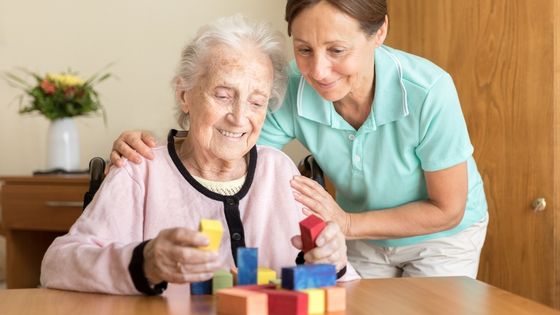Caring for someone with dementia or any memory loss disease can be difficult. Figuring out how to help someone with dementia is undeniably a taxing feat; however, a few tips can help you assist them in being more comfortable and living a better lifestyle.


Help Maintain Their Independence
Independence is the one thing all adults do not want to give up. No one wants to be treated like a child, regardless of any disease or disability they may have – and this is why it’s important to help keep a dementia patient’s independence.
You can help a family member or friend with dementia maintain their independence by writing reminders and simple to-do lists and showing you’re proud of them when they complete daily tasks. Also, label household items and cupboards so your loved one can easily find the correct cabinets and their corresponding storage spaces should they need to complete chores.
Simple but effective support in this way doesn’t just help your loved one uphold their independence; it also keeps their self-esteem from dropping – and bolstering self-esteem is ideal if you’re wondering how to help dementia patients in terms of their mental health and emotional wellbeing.
Ask for Help
Looking after someone who has dementia can be demanding and a difficult task to do, which is why you need to ask for help. Asking for support does not mean that you have given up, but rather that you want the best for your loved one.
One way of getting support is by joining a support group. There are so many people going through the same feat of caring for a loved one with dementia, and if you talk to others in your shoes, it may help you feel less alone and make you realize you are doing the best you can.
Joining a support group can also give you even more tips and tricks to help you and your loved one cope with dementia – suggestions that you might not have even thought about.
Consider Residential Cares
The last thing you want to do is put a family member in a care home, but unfortunately, it may be the best for both of you. Your loved one with dementia will get the care and attention they need in order to live a happy, healthy, and safe life throughout their golden years. Plus, having them cared for by trained professionals will also give you a break, allowing you to focus on your own life while still being able to visit your relatives and enjoy quality time with them in a safe environment where all their daily needs are met.
Introduce New Hobbies
Hobbies can keep a dementia patient’s cognitive functions going. From reading, arts and crafts, doing puzzles, and even just dancing to music, any kind of hobby can help keep those cogs turning and life enjoyable. Not only can hobbies help your loved one function, but they will also have a more positive outlook since they’re getting involved with activities that they enjoy.
Their hobby doesn’t have to be confusing or complex either; it can be as simple as reading a magazine, going for a walk with you or another friend, sketching and coloring books, or watching movies, documentaries, and TV series. There’s also no pressure for them to perfect at whatever hobby they choose – as long as they enjoy it, it can be beneficial to their mental health and wellbeing.
If your loved one loves nature and the outdoors, perhaps you could help them start gardening, birdwatching, or even wildlife photography. Or, you could even get them to go walking with other people who also like nature and walks – that way, they get exercise to keep fit and healthy as well as socialization.
Suppose they enjoy reading – why not buy them a new book series or perhaps a batch of comics from their childhood? The latter might even spark some happy memories from when they were younger, which can only be a positive thing.
Another excellent way to maximize the benefits they get from engaging in hobbies and activities is music. You can put some music on whilst they do whatever activity they want to do, which helps to stimulate their mind, improve the atmosphere, and can help them feel happier and more positive – music has that effect on humans, after all, no matter what age they are!
















